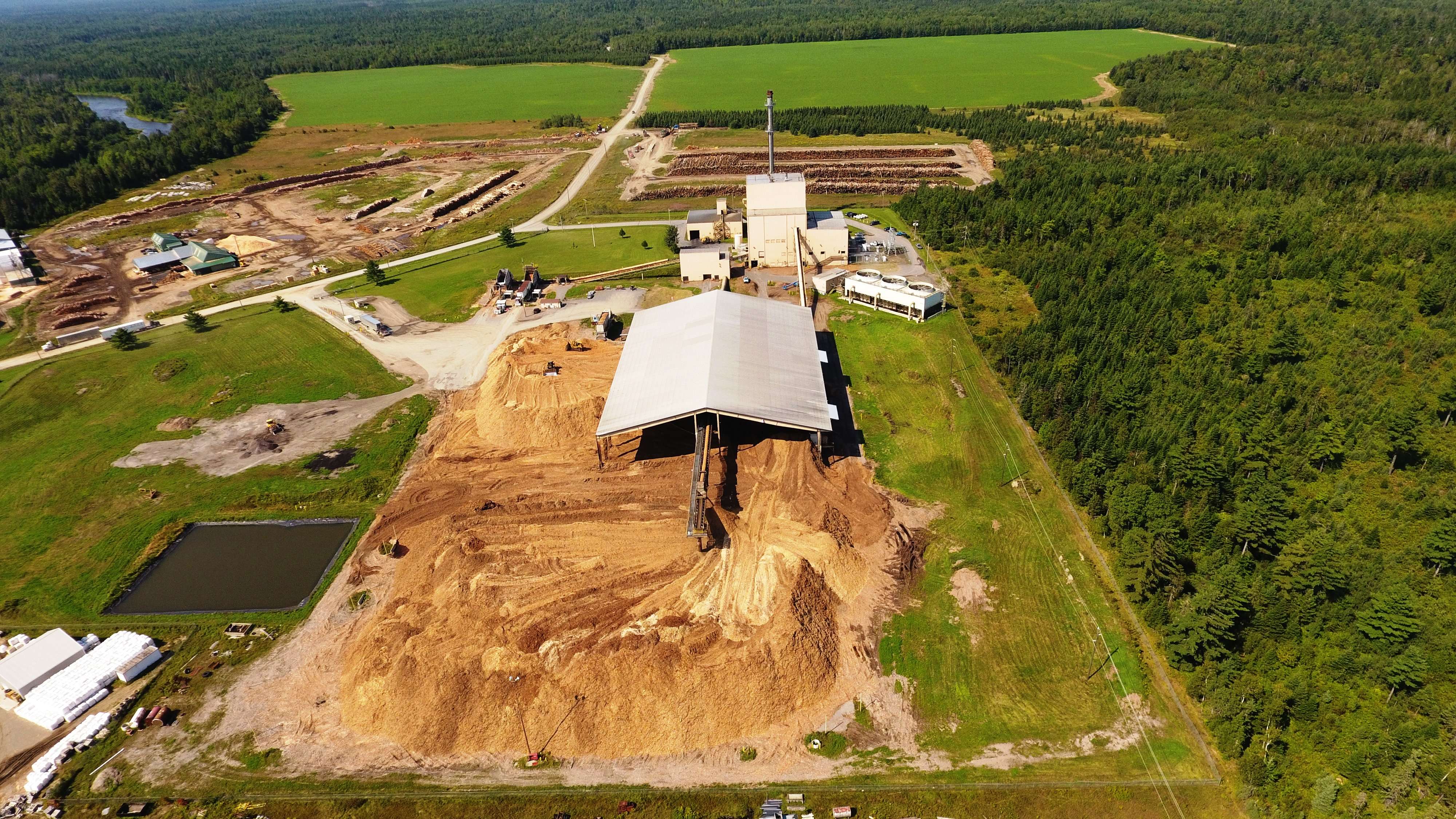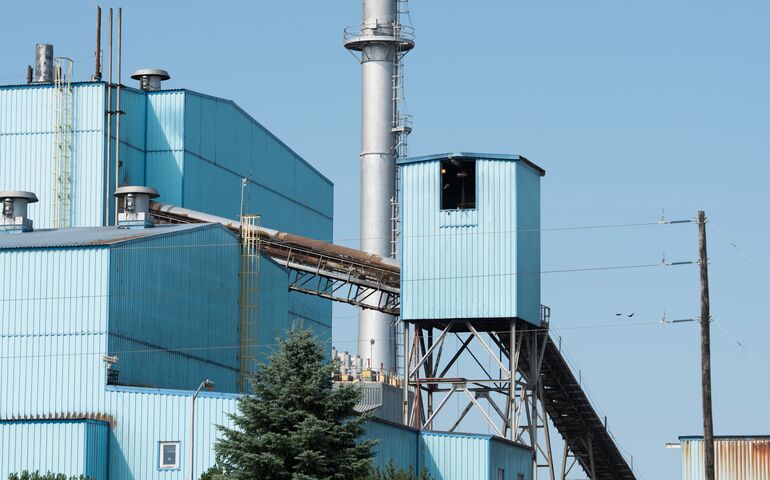
ReEnergy, local officials collaborate to redevelop Fort Fairfield property
 Courtesy / ReEnergy Biomass Operations
ReEnergy Biomass Operations is working with the town of Fort Fairfield and Aroostook Partnership to pursue redevelopment opportunities for the now-unused ReEnergy Fort Fairfield parcel.
Courtesy / ReEnergy Biomass Operations
ReEnergy Biomass Operations is working with the town of Fort Fairfield and Aroostook Partnership to pursue redevelopment opportunities for the now-unused ReEnergy Fort Fairfield parcel.
ReEnergy Biomass Operations is working with the town of Fort Fairfield and Aroostook Partnership to pursue redevelopment opportunities for the now-unused ReEnergy Fort Fairfield parcel on Cheney Grove Road.
The 37-megawatt ReEnergy Fort Fairfield biomass power facility terminated operations in November 2018 due to challenging market conditions, according to an April 17 news release emailed to Mainebiz. It had used sustainably harvested biomass, composed of forest and mill residues, to annually produce approximately 260,000 net megawatt hours of renewable energy. That’s enough electricity to supply about 34,000 homes.
“We have been in continuous contact with local officials to maximize the potential for a redevelopment of this parcel,” Larry Richardson, chief executive officer of ReEnergy Biomass Operations, said in the release. “Although we are no longer operating at that site, the Fort Fairfield community and its citizens remain important to us and we continue to engage in dialogue to determine the most effective way to market the parcel. We have enjoyed doing business in Fort Fairfield and Aroostook County and hiring local residents and contractors, and we are optimistic that the parcel will be put to productive use in the future.”
ReEnergy Holdings LLC, an Albany, N.Y.-based renewable energy company, acquired a portfolio of five biomass energy-production facilities in Maine and New York in December 2011, from Quebec-based Boralex Inc., for about $88 million.
The newly acquired facilities in Maine were ReEnergy Ashland, ReEnergy Fort Fairfield, ReEnergy Livermore Falls and ReEnergy Stratton. The facilities rely principally on forest residue to produce renewable energy.
It also owns a recycling plant in Lewiston.
ReEnergy closed the Fort Fairfield plant last November and is in the process of closing its Ashland plant. The closures were due to a downturn in wholesale electricity prices as well as a downturn in renewable energy credits produced at all ReEnergy power plants, Richardson told Mainebiz in a subsequent interview.
Fort Fairfield
The Fort Fairfield biomass plant opened in 1987 as a 37-megawatt plant on 32 acres, generating electricity from lumber mill residues and wood chips. It most recently employed about 25 people before closing in November
“We have heard anecdotally of several former Fort Fairfield employees finding other employment,” Director of Communications Sarah Boggess told Mainebiz. “Two relocated to our Livermore Falls location and four relocated to our Ashland facility to help lay up that plant.”
Richardson said ReEnergy has provided tours in recent weeks to interested parties and looks forward to continued visits and conversations regarding redevelopment of the site.
“We can’t be specific about the parties we’ve talked with,” he said. “But they have an interest in potentially locating an operation in Fort Fairfield. It’s a good site with utilities and other infrastructure on the site. We believe there is some active interest on the part of some parties to use the site in a different way than we have.”
ReEnergy has selected a contractor to dismantle the plant, and has started the permitting process with Maine Department of Environmental Protection to secure approvals necessary to remove the power plant and related infrastructure. That includes a 5,800-square-foot turbine building and a 4,200-square-foot boiler building, plus heavy industrial equipment like a boiler, instrumentation, materials-handling equipment, conveyors, and a turbine generator that produces the electricity from the steam produced in the boiler.
Richardson said the site is likely to be more marketable if it is shovel-ready for new development, and that ReEnergy is interested in considering a transfer of the site to the town or to a local nonprofit entity.
“In our continuing efforts to be a good corporate citizen, we want to make it as easy as possible to make this site marketable to bring to another business and employment to the town,” he said.
It’s expected that DEP approvals could come within the next month or so. Removal work is likely to be completed between June and August. In the meantime, the company will continue to meet with prospective buyers. The price is subject to negotiations, he said.
“We are diligently working together as a team to determine the most appropriate entity to redevelop this parcel and create new jobs and tax revenue,” Fort Fairfield Town Manager Andrea Powers said in the release. “This parcel has a rail spur; has the potential for compressed natural gas; is close to an airport and Interstate 95 and is fewer than four miles from the Trans Canada Highway. It also is located in a Municipal Tax Increment Financing District, Empowerment Zone, and Pine Tree Zone.”
“I’m encouraged that we’re all working together on solutions to address the closure of an important Aroostook County economic asset in Fort Fairfield,” Paul Towle, president and CEO of the Aroostook Partnership, a private/public non-profit organization to promote economic development in Aroostook County, said in the release.

Ashland plant
ReEnergy is taking a different approach to its Ashland plant, Richardson said.
“We believe there could be an opportunity in the relatively near future to take a different approach, with the potential of restarting it at some point,” he said. “The configuration there is a bit different.”
Under consideration is co-location of other industries that would be compatible with the Ashland site, he said.
“We’re in discussion with various parties to find a solution that would allow us to restart the plant, and we’re also monitoring the backdrop of the market conditions,” he said.
For potential co-locating operations, said Boggess, “We’ve had lot of interest with industry in the biofuel space. We also think it would be a suitable location for a data center or an aquaculture facility.”
Co-locating operations would get energy from the plant. And some biofuel facilities would be able to leverage existing infrastructure on the site, Richardson said.
There’s no particular time frame for deciding the restarting of or co-locations at Ashland, he said.
The Ashland plant was built in 1993. It produced 284,000 net megawatt-hours of electricity each year — enough to supply about 37,000 homes.
Livermore Falls, Stratton
ReEnergy’s plants in Livermore Falls and Stratton remain profitable, said Richardson.
“The difference between the Livermore Falls and Stratton plants versus the Fort Fairfield and Ashland plants is that the two plants in Aroostook County are not on the New England transmission grid,” he said. “As a result, those plants incur significant additional costs in the form of transmission fees or outcharges. Those additional costs really put the Ashland and Fort Fairfield facilities at a severe disadvantage financially.”
The Livermore Falls and Stratton facilities do not have that disadvantage, he added.
In 2011, when ReEnergy acquired the portfolio, it was aware the Fort Fairfield and Ashland plants would incur those additional costs.
“But the market at that time supported operation of the Fort Fairfield plant,” he said. “When we acquired the portfolio, the Ashland plant was not operating. We still acquired it with an eye toward the potential of restarting it when all the market conditions made it sensible to do so. Those conditions did come to fruition in 2014. At that time, we invested several million dollars to rehab that plant and we restarted it. But since that time, market conditions have deteriorated. That led to our decisions to close it again.”
Overall industry
The overall biomass energy industry is region-specific, in terms of state and policy support for biomass as an integral part of the renewable energy industry, as well as support for the forest products industry, said Richardson.
“We’re at the intersection of those two industries,” he said. “In states like California right now, the industry is very healthy. It comes down to public policy. I think Maine could be much more supportive of the biomass energy industry than in the past.”
ReEnergy, he said, is currently keeping an eye on LD 1494, “An Act To Reform Maine's Renewable Portfolio Standard,” sponsored by Sen. Eloise Vitelli, D-Sagadahoc, and sent to the Legislature’s Committee on Energy, Utilities and Technology earlier this month. The bill would increase the percentage of renewable supply sources, including biomass, for retail electricity from 10% to 50% by 2030.
“If this legislation does move through and becomes law, it would be a significant step in the right direction for state support of the biomass energy industry,” Richardson said.
ReEnergy Holdings LLC, a portfolio company of Riverstone Holdings LLC, owns and operates facilities that use forest-derived woody biomass and other waste residues to produce renewable energy. ReEnergy was formed in 2008 by affiliates of Riverstone Holdings LLC and a senior management/co-investor team comprised of experienced industry professionals.
ReEnergy owns and or operates 300 MW of installed renewable energy generation capacity, and employs approximately 290 people in six states.










0 Comments